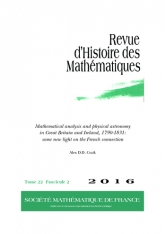Analyse mathématique et astronomie physique en Grande-Bretagne et en Irlande (1790-1831) : quelques nouveaux éclairages sur les liens français
Mathematical analysis and physical astronomy in Great Britain and Ireland, 1790-1831 : some new light on the French connection

- Consulter un extrait
- Année : 2016
- Fascicule : 2
- Tome : 22
- Format : Électronique
- Langue de l'ouvrage :
Anglais - Class. Math. : 01A50, 01A55, 00A17, 97A30, 97A40, 97I40, 70F15.
- Pages : 223-294
- DOI : 10.24033/rhm.195
On examine ici la réception à la fin du dix-huitième siècle, parmi des mathématiciens de Grande-Bretagne et d'Irlande, de l'analyse mathématique française et de ses applications à astronomie. Les premières contributions britanniques furent celles de John Robison, John Playfair, Robert Woodhouse, John Toplis, John Brinkley, John West, William Spence, John Herapath, James Ivory, William Wallace, et Mary Somerville. Cet article présente leurs activités et leurs publications, ainsi que quelques autres. Les comptes rendus de John Playfair et Robert Woodhouse sont étudiés de près. On analyse enfin les raisons pour lesquelles, en dépit des travaux de ces individus, la réforme des mathématiques en Grande-Bretagne a d'abord été si lente, et pourquoi la réforme du Cambridge Mathematical Tripos, elle, a finalement débouché sur une amélioration rapide.

